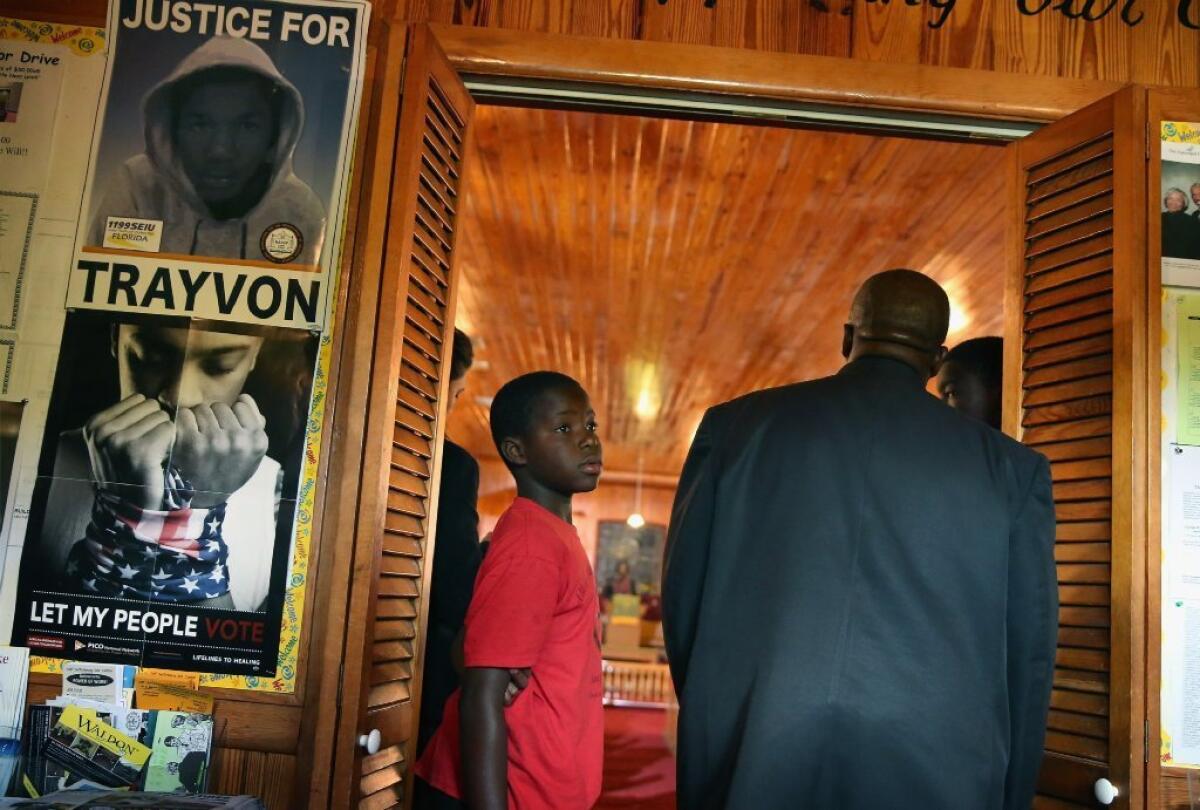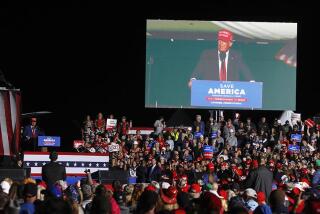Reaction to Zimmerman verdict: âAll right we are two nationsâ

The trial is over, George Zimmerman has been acquitted, and the earliest demonstrations after the Florida verdict Saturday night came and went mostly in peace.
Yet if the high drama has ended over the legal question of whether Zimmerman would be punished for the 2012 slaying of 17-year-old Trayvon Martin in Sanford, Fla., writers have begun confronting the legal and moral implications of a not-guilty verdict.
Hereâs a sample of some of those early reactions.
At BuzzFeed, Elliot Felig, a former assistant district attorney, focused on the legal mechanics of the prosecution.
âZimmermanâs acquittal came as no surprise because of a number of things that happened at this trial, none of which I had ever seen before, and all of which favored the defense,â Felig wrote.
Feligâs list: The prosecutionâs witnesses undercut the prosecutionâs case; a prosecution witness said he believed the defendant; another witness corroborated Zimmermanâs version of events; Zimmermanâs interview with Fox News before the trial was played as testimony, but without the chance of cross-examination; and attempting to prove Zimmerman committed racial profiling by following Martin would not have proved relevant for conviction.
On the caseâs merits, the Atlanticâs Ta-Nehisi Coates wrote, âI think the jury basically got it right,â but said âthe message of this episode is unfortunate.â
âBy Florida law, in any violent confrontation ending in a disputed act of lethal self-defense, without eyewitnesses, the advantage goes to the living,â Coates wrote. âAn intelligent, self-interested observer of this case, who happens to live in Florida, would not be wrong to do as George Zimmerman did -- buy a gun, master the finer points of Florida self-defense law and then wait.â
Reason.comâs Jacob Sullum noted that Floridaâs much-maligned âstand your groundâ law did not ultimately affect Zimmermanâs acquittal: Zimmerman was probably acting in self-defense.
âKnocked down and pinned to the ground by Martin, Zimmerman would not have had an opportunity to escape as Martin hit him and knocked his head against the concrete,â Sullum wrote. âThe duty to retreat therefore was irrelevant.â
Yet even if some commentators found the juryâs verdict to be technically sound, others wrote that the killing of Martin -- without criminal punishment -- wounded the conscience.
âThe jury obviously determined that Zimmerman acted in self-defense,â the Los Angeles Timesâ Robin Abcarian wrote after the ruling. âBut itâs worth remembering something that must send a chill down the spine of every parent of a black teenager in this country: Zimmerman was the architect of the events of that night.â
The calls by many officials and civic leaders across the country for peace after the verdict led the Guardianâs Gary Younge to ask whether those leaders were being reasonable.
âAppeals for calm in the wake of such a verdict raise the question of what calm there can possibly be in a place where such a verdict is possible,â Younge wrote. âParents of black boys are not likely to feel calm. Partners of black men are not likely to feel calm. Children with black fathers are not likely to feel calm. Those who now fear violent social disorder must ask themselves whose interests are served by a violent social order in which young black men can be thus slain and discarded.â
Other writers cited the historical weight of prejudice against black men as a primary cause for disappointment.
âFrom the outset â throughout the 44 days it took for there to be an arrest, and then in the 16 months it took to for the case to come to trial â there was a nagging suspicion that it would culminate in disappointment,â Jelani Cobb wrote for the New Yorker. âCall this historical profiling. The most damning element here is not that George Zimmerman was found not guilty: Itâs the bitter knowledge that Trayvon Martin was found guilty.â
Gawkerâs Cord Jefferson reflected on being young and black, and wrote that the ruling was âa vivid reminder that we must always be deferential to white people, or face the very real chance of getting killed.â
âTrayvon Martin is dead â and so many young men like him are dead or in prison â because in America it was his responsibility to take it,â Jefferson wrote. âIt was his responsibility to let a stranger with a gun follow him at night in his own neighborhood and suspect him of wrongdoing. It was his responsibility to apologize for being a black kid who scared people. It was not George Zimmermanâs responsibility to let a boy get home to his family.â
The National Reviewâs Roger Clegg lambasted the media coverage of the case and blamed prosecutors for raising charges âjust to appease the gods of political correctness.â
âIt was an unedifying experience for the country,â Clegg wrote. âThere are too many with a wedded interest in denying the fact that America offers amazing opportunities to all and that our interracial relations are today astonishingly good â but the death of Trayvon Martin and prosecution of George Zimmerman gave them the national platform. And they will not relinquish it easily.â
Esquireâs Charles Pierce reflected his exasperation that George Zimmerman could get back in his car with his gun and continue to patrol the streets. Pierce closed with this thought: âNothing good has come of this whole situation. Nothing. And the last word, as it so often does in situations like this, belongs to John Dos Passos: âAll right we are two nations.ââ
ALSO:
Zimmerman not guilty: Reactions include joy, tears, disbelief
George Zimmermanâs acquittal: Nation reacts to not-guilty verdict
Zimmerman lawyer calls prosecution âdisgracefulâ; Martin lawyer calls for calm
More to Read
Sign up for Essential California
The most important California stories and recommendations in your inbox every morning.
You may occasionally receive promotional content from the Los Angeles Times.











